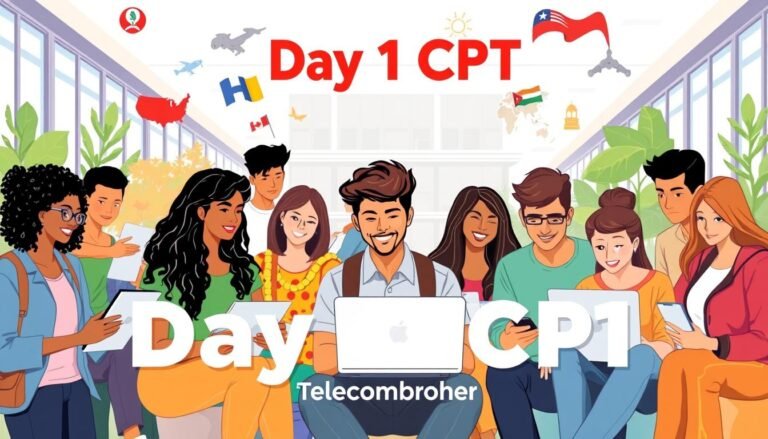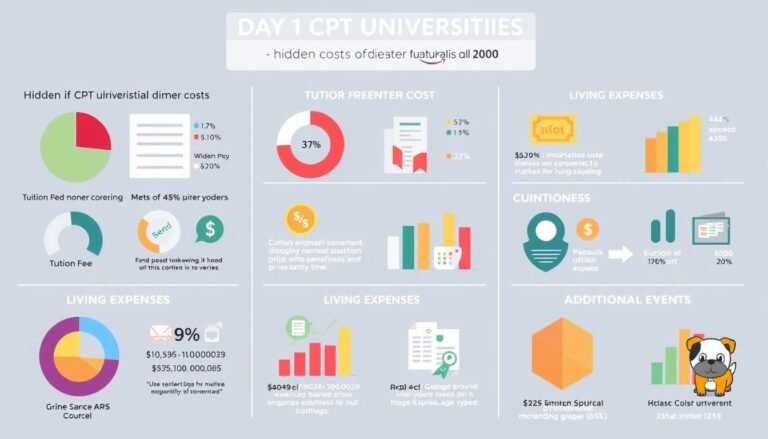Are you ready to tackle the complex world of Day 1 CPT H1B RFEs? It’s a tightrope between keeping up with your studies and chasing your career dreams. Working with Curricular Practical Training (CPT) can be challenging.
Since 2017, H1B RFEs have changed a lot. In FY 2019, they peaked at 40.2%. But now, they’re around 9.8% in FY 2023. Knowing these changes is key for work visa consulting.
The H1B RFE process needs careful attention. You have a 10% chance of getting an RFE in 2024. But, you can overcome 80% of these challenges with the right strategies. This knowledge is crucial for your H1B visa needs.
Key Takeaways
- Understand the evolving landscape of H1B RFEs
- Maintain strict academic compliance with CPT requirements
- Prepare comprehensive documentation proactively
- Stay informed about changing immigration policies
- Seek professional guidance when needed
Understanding H1B RFE: What You Need to Know
Dealing with employment-based immigration can be tough, even more so with an H1B Request for Evidence (RFE). In 2019, about 60% of H-1B petitions got an RFE. Knowing how to handle this is key for visa application support.
What is an H1B RFE?
An H1B RFE is when the USCIS asks for more documents to support your visa application. They issue this request when they need more info to decide. It’s a chance to make your application stronger.
Why Do H1B RFEs Occur?
Getting an RFE means USCIS found some issues with your application. The main reasons include:
- Not enough proof of your specialty job
- Unclear employer-employee relationship
- Missing educational documents
- Job description not clear
Common Reasons for H1B RFE
Knowing what often causes RFEs can help you improve your application. Key areas to focus on are:
- Degree Relevance: If your degree doesn’t fit the job
- Work Location: Showing your employer supervises you even when you work from home
- Wage Compliance: Proving you’re paid at or above the minimum wage
The burden of proof always lies with the petitioner to establish eligibility for the H-1B benefit.
Only about 60% of petitions get approved after an RFE. Being well-prepared is your best strategy. You have 60 days to respond, and there’s no way to extend it.
The Importance of Full-Time Study Compliance for H1B RFE
Understanding USCIS compliance is key for international students applying for H1B visas. Making sure you’re studying full-time is crucial. It affects your visa application and can lead to an H1B Request for Evidence (RFE).

Keeping your student status is very important. The H1B RFE rates have changed a lot. In 2020, it was 28.8%, but in 2023, it dropped to 9.8%. This shows how vital it is to stay focused on your studies and keep good records.
How Full-Time Study Relates to H1B RFE
Your study status is a big factor in getting a H1B visa. USCIS checks if you’re studying full-time to see if you qualify. They look at:
- If you’re enrolled full-time all the time
- Your academic progress
- If you follow your school’s rules
Proving Full-Time Study Compliance
To answer an H1B RFE well, you need to show you’re really studying. Here are some tips:
- Get official transcripts
- Keep detailed records of your studies
- Get letters from your school to support your application
Documenting Your Academic Engagement
For a successful H1B RFE response, you need to provide detailed documents. The approval rate for RFEs has gone up, from 73.4% in 2020 to 81.0% in 2023. This shows how important it is to prepare well.
“Attention to detail in your academic documentation can make the difference between approval and additional scrutiny.” – USCIS Immigration Expert
| Year | RFE Rate | Approval Rate |
|---|---|---|
| 2020 | 28.8% | 91.4% |
| 2021 | 16.2% | 97.3% |
| 2022 | 9.6% | 98% |
| 2023 | 9.8% | 97.2% |
By managing your academic documents well and knowing USCIS rules, you can boost your chances of a good H1B RFE response.
Working with CPT and H1B RFE: Key Considerations
Dealing with Curricular Practical Training (CPT) can be tough for international students. They often need help with work visa consulting and H1B RFE applications. It’s important to know how CPT affects your visa journey for a successful application.
Understanding Curricular Practical Training (CPT)
CPT is a key part of F-1 student work experiences tied to your academic program. Here are some important points about CPT:
- It’s needed for your studies
- It must be a big part of your degree
- It gives you work experience in your field
CPT’s Impact on H1B RFE
How you use CPT can affect your H1B RFE outcome. Students with over a year of full-time CPT may get extra checks. USCIS looks closely at how your studies and practical training connect.
Careful documentation is your strongest defense in an H1B RFE process.
Necessary Documentation for CPT and H1B RFEs
To make your H1B RFE response stronger, gather these documents:
- Detailed CPT authorization forms
- Letters from your academic advisor
- Full records of your work experience
| Documentation Type | Purpose | USCIS Importance |
|---|---|---|
| CPT Authorization | Verify work alignment with studies | High |
| Academic Letters | Confirm program relevance | Critical |
| Work Experience Records | Demonstrate practical learning | Essential |
About 33% of H-1B applicants drop out after facing initial hurdles. But, with the right preparation and documents, you can avoid this fate when dealing with an H1B RFE.
Responding to an H1B RFE: Best Practices
Handling an H1B Request for Evidence (RFE) can be tough. But, with the right steps, you can meet USCIS requirements. Knowing how to handle RFEs is key for immigration success.

Gathering Required Documentation
Having all the right documents is essential for a good RFE response. Make sure you have:
- Detailed educational transcripts
- Proof of specialized work experience
- Comprehensive job descriptions
- Supporting letters from employers
Crafting Your Response Strategy
Being precise is crucial when dealing with an H1B RFE. Your response should be:
- Clear and concise
- Directly answering each USCIS query
- Supported by robust evidence
- Professionally formatted
“Attention to detail can transform an RFE from a potential roadblock to a successful visa approval.” – Immigration Law Expert
Critical Timeline Considerations
USCIS gives you 90 days to respond to an RFE. Knowing this deadline is vital for keeping your immigration status.
| RFE Response Component | Recommended Timeframe |
|---|---|
| Document Collection | 30-45 days |
| Response Preparation | 15-20 days |
| Final Review | 5-10 days |
| Submission Buffer | 5-15 days |
Pro tip: Always submit your RFE response well before the 90-day deadline to show you’re proactive and committed to USCIS compliance.
The Role of Your Academic Institution in H1B RFE
Understanding H1B visa rules can be tough. Your school is key in helping you with your immigration needs, like when you get a Request for Evidence (RFE).
Schools help a lot by offering different ways to improve your visa application.
Support from Your Designated School Official (DSO)
Your Designated School Official (DSO) is a big help during the H1B RFE process. They can assist you by:
- Checking if you’re studying full-time
- Giving you official academic records
- Explaining your program’s educational needs
- Guiding you on what documents you need
Academic Opinion Letters for H1B RFE
Academic opinion letters can really help your H1B application. These letters, from professors or school administrators, confirm your education and its link to your job.
Expert opinions can fill in educational gaps and show you’re right for the job.
Navigating School Policies Regarding H1B RFEs
Every school has its own rules for helping international students with H1B. Knowing these rules is key for a good RFE response.
| Institution Support Levels | Typical Services |
|---|---|
| Basic Support | Transcript verification |
| Intermediate Support | Academic record compilation |
| Comprehensive Support | Detailed opinion letters, credential evaluation |
Working closely with your school can really help with H1B RFE issues. Your school is your ally in the complex world of employment-based immigration.
Common Mistakes to Avoid When Addressing H1B RFE
Dealing with an H1B RFE can be tough. Knowing common mistakes can boost your chances of getting your visa.
Many applicants make big errors during the H1B RFE process. These mistakes can ruin your application. Spotting these early can help you make a stronger response.
Documentation Oversight Risks
Missing documents is a big reason for H1B RFE problems. USCIS says about 30% of RFEs happen because of missing or bad documents.
- Failing to include comprehensive academic transcripts
- Omitting critical employment verification letters
- Neglecting to provide detailed job description documentation
Information Accuracy Challenges
Getting your information wrong can lead to an RFE rejection right away. It’s key to double-check every detail for visa support.
| Common Information Errors | Potential Consequences |
|---|---|
| Inconsistent employment dates | Immediate RFE denial |
| Mismatched educational credentials | Request for additional verification |
| Incomplete work authorization documentation | Potential application suspension |
Response Timing Critical
Being slow to respond can hurt your H1B RFE chances. Stats show a 70% denial rate if you miss deadlines.
*Prompt and precise communication is your strongest asset in addressing an H1B RFE.*
Here are some proactive steps:
- Track RFE receipt dates carefully
- Get your documents ready early
- Get help from immigration experts
Studies show getting help from pros can increase your success rate by 60%.
Strengthening Your Case: Tips for a Successful H1B RFE Response
Handling an H1B Request for Evidence (RFE) can be tough. But, with the right steps, you can boost your success chances. It’s all about strategic preparation and detailed documentation.
Clear and Concise Communication
Your response to an H1B RFE must be clear. USCIS officers see many applications. So, a simple, direct approach helps them get your point quickly.
- Use precise, professional language
- Address each point of the RFE directly
- Organize documents logically
- Avoid unnecessary technical jargon
Ensuring Consistency in Documentation
Consistency is key in work visa consulting. Any document mismatch can raise concerns and harm your application.
- Cross-check all submitted documents
- Verify educational credentials match job requirements
- Align job descriptions with specialty occupation criteria
- Provide comprehensive evidence of qualifications
Seeking Professional Assistance for H1B RFE
Professional immigration services are very helpful for H1B RFE responses. Experienced immigration lawyers know the detailed needs and can write a strong response.
*Statistics show that well-prepared RFE responses can improve approval chances by up to 70%.*
Think about getting help from an immigration expert. They can give you specific advice for your situation. Their knowledge can help you through the complex immigration process and increase your approval chances.
Final Thoughts on H1B RFE and CPT Compliance
Understanding the H1B RFE process is key. You need to plan well and know the visa requirements inside out. Being ready with the right documents can help avoid delays and boost your approval chances.
It’s vital to keep up with immigration policy changes. The H-1B program has seen big updates in 2023 and 2024. These changes affect how jobs are classified, so knowing the latest rules is crucial.
Creating a strong case for H1B approval means having solid documents and showing you’re qualified. Getting help from experts can make a big difference, mainly for tricky RFEs. Each piece of evidence should clearly link your education and work experience to the job you’re applying for.
Your aim is to tell a story that shows your value and meets USCIS standards. With careful preparation, ongoing learning, and the right documents, you can tackle the immigration process with confidence. This will help you achieve a successful visa outcome.







